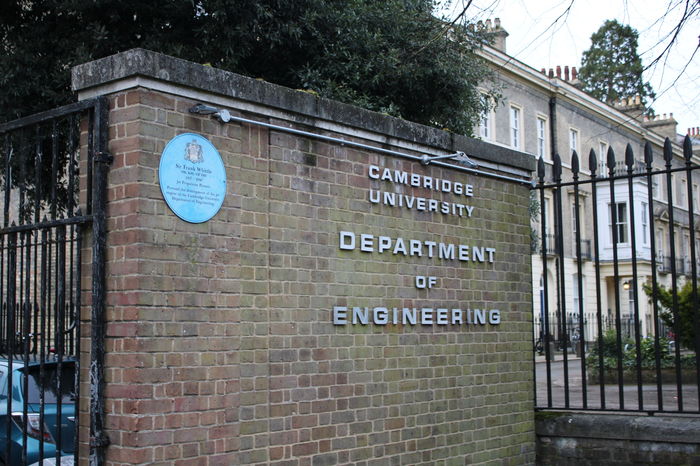Uni commits to partial arms divestment after year-long review
The University Council voted to accept a report’s advice to stop investing in companies producing ‘controversial weapons’

The University of Cambridge has voted to divest from companies involved in producing “controversial weapons” but has stopped short of committing to a full arms divestment, after accepting the recommendations of a year-long review.
The report, approved unanimously by the University Council on Monday, follows sustained student pressure – including protests and encampments – urging Cambridge to cut its financial ties with the defence industry.
Chaired by Professor Graham Virgo, Master of Downing College, the Working Group on Investments was established in July 2024 to review Cambridge’s financial links to the arms sector.
Cambridge runs its investments through a £4.2 billion endowment fund, the Cambridge University Endowment Fund (CUEF), separately ran to the University despite being wholly owned by it.
In the review’s lengthy report, in which 11 primary recommendations were made, the most significant was for the fund to divest from “any company which manufactures weapons illegal under UK law, even if those weapons are legal elsewhere,” a category that includes chemical, biological, and cluster munitions.
This decision marks the first time the University has excluded investments on the basis of their connection to arms production.
However, the Working Group did not recommend divestment from companies involved in manufacturing “conventional weapons” – those used in standard combat operations and not classified as nuclear, biological, or chemical. According to the report, Cambridge’s current exposure to such companies is already below 1% of its total investments.
The report proposed three options for Council to consider at its next meeting, expected on 20 November: to maintain the current approach, to set a formal 1% cap on investments in conventional weapons (effectively preserving the status quo), or to establish a timeline for complete divestment from all weapons manufacturers to 0%.
The Working Group also recommended to the University the consideration of a dedicated body to oversee ethical investment decisions.
One option put forward in the recommendations, which sources say was supported by the vice-chancellor Deborah Prentice, is to assign this role to the Committee on Benefactions and External and Legal Affairs (CBELA).
CBELA is chaired by Vice-Chancellor Professor Deborah Prentice and has a wide remit, though some members have called for a fully independent committee. The question is expected to be decided at next month’s Council meeting.
Cambridge for Palestine (C4P), which has led student protests over the last few years, described the Working Group as a “direct concession to our movement’s power”.
A spokesperson said: “By deciding to divest from companies manufacturing weapons legal in their country of manufacture but illegal under UK law, the University has been forced to demonstrate that arms divestment is possible. Currently, this falls frighteningly short of the historical moment, as the University has yet to make a decision on its ties to the conventional weaponry such as guns, tanks, bombs or aircraft used to commit illegal occupation and international crimes including crimes against humanity, war crimes, and genocide in Palestine.
“Nevertheless, through this forced reckoning, the Cambridge University Council has been made to accept, for the first time, that complete divestment from the arms industry is a legitimate option it can pursue. The report acknowledges that one of the options is that the ‘the University should not invest in any company which manufactures any weapons’,” they continued.
The statement concluded: “As students and community members, we see this report as a clear mandate ripped from the hands of the administration. The University cannot claim moral or academic integrity while maintaining partnerships with weapons manufacturers or companies complicit in genocide and the oppression of the Palestinian people. […] This report proves that Cambridge has the power to act morally if it chooses to. The question now is whether it will choose to stand on the side of justice or continue to profit from war and occupation.”
University Councillor Daragh O’Reilly told Varsity: “A fighting students’ movement is on the cusp of winning divestment from the worst weapons of war. All students now need to join the fight for full implementation of this report. Getting Cambridge’s cash out of the weapons of genocide is a moral victory the Council must back on November 24th.”
Richard Penty, Head of the University’s School of Technology, stated: “I broadly welcome the Working Group’s recommendations. It is vital that Cambridge continues to foster its world-leading research collaborations with the UK defence sector. In an era of heightened global tensions and rapid technological change, these collaborations are essential – not only to help our industrial partners to remain at the forefront of innovation, but to uphold our national security and resilience.
“They also provide our outstanding students with world-class technical training and pathways into high-impact careers with major UK employers. By sustaining these relationships, Cambridge contributes to both the UK’s long-term strategic interests while driving prosperity and growth,” he added.
Augustin Denis, Postgraduate President of the Students’ Union and member of the Council, said: “The university’s acceptance of the report is only the first step towards the recognition of its institutional responsibility. All institutions have a duty to prevent genocide. Now that the university has accepted that a serious look at the ways it provides support to the arms industry is needed, it must act accordingly.The fundamental question it now needs to answer looking history in the eye, without flinching is:Is Cambridge able to ensure that none of its money will come from the profits made from the oppression and genocide of the Palestinian people?
“The students have known what task has befallen onto them by camping on King’s Parade. They understand the stakes of the political moment, and, crucially, understand the significance of their struggle for the liberation of Palestine from imperialist interference and colonisation. This sense of responsibility has led them to win divestment at King’s college and now claim a new win in forcing the university through this report to concede that complete divestment from arms is a legitimate option that the university should choose to pursue.
On this, the students are united, and as such, are headed for victory,” Denis continued.
Initially scheduled to be concluded in Michaelmas 2024, the review was pushed back, provoking accusations at the time of “back-pedalling” and “watering down” its commitments to students.
The lengthy review process included a town hall event in June, attended by hundreds of students and staff. Nearly 70% of respondents to a consultation expressed opposition to any investment or research collaboration with the defence industry.
Last week, the Cambridge Students’ Union shared an open letter calling for full divestment. Next week, the SU is due to hold a referendum on the following question: “Should Cambridge SU campaign to end university investments and collaborations with institutions involved in occupation and weapons manufacture as detailed in this policy motion?”
Meanwhile, earlier this year, King’s College became the first constituent college to commit to complete divestment from arms companies – a move described by its Provost, Gillian Tett, as “a positive result from a process that engaged voices from all areas of our community.”
In July, Varsity reported that Dr Colm Durkan, head of the Department of Engineering, allegedly said that divestment from companies in the arms industry would pose an “existential” threat to the department and the wider University.
The University of Cambridge has been contacted for comment.
 News / Colleges charge different rents for the same Castle Street accommodation2 March 2026
News / Colleges charge different rents for the same Castle Street accommodation2 March 2026 News / King’s hosts open iftar for Ramadan3 March 2026
News / King’s hosts open iftar for Ramadan3 March 2026 Theatre / Lunatics and leisure centres 4 March 2026
Theatre / Lunatics and leisure centres 4 March 2026 News / Angela Merkel among Cambridge honorary degree nominees27 February 2026
News / Angela Merkel among Cambridge honorary degree nominees27 February 2026 News / News in Brief: waterworks, wine woes, and workplace wins 1 March 2026
News / News in Brief: waterworks, wine woes, and workplace wins 1 March 2026








